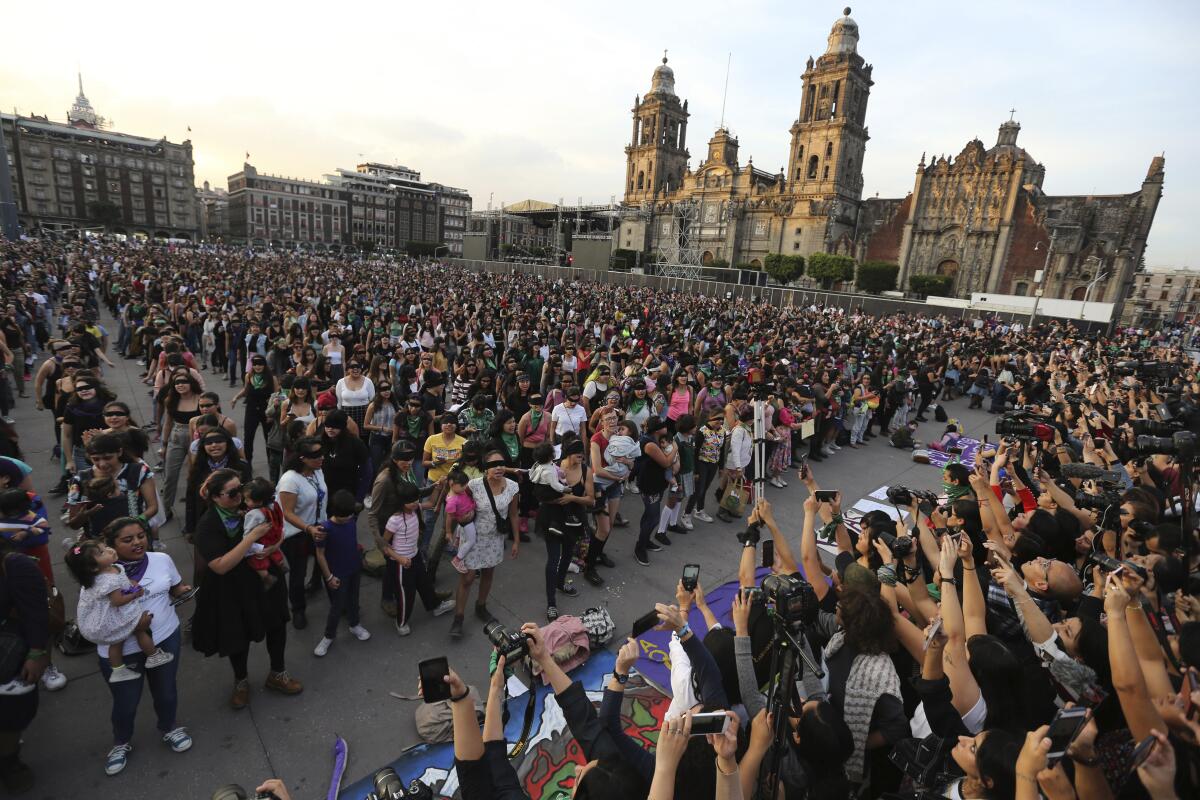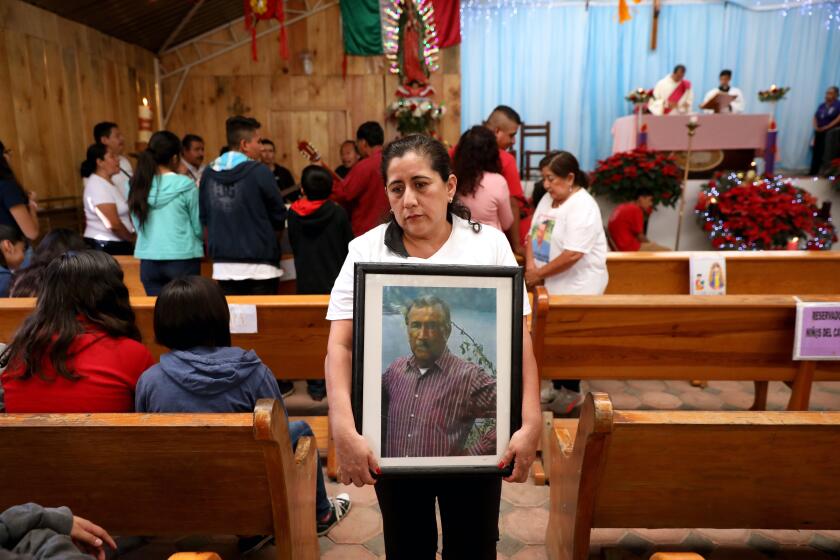What would a world without women look like? On March 9, Mexico may find out

MEXICO CITY — After a string of gruesome killings of women, feminist activists here began wondering: What if we all just disappeared?
Mexico is about to find out. Women across the country are being urged to skip work next Monday, stay off the streets and purchase nothing for 24 hours.
The March 9 national strike, which is being promoted as #UNDIASINMUJERES, or “a day without women,” is meant to deliver an economic punch to cast light on what activists describe as a crisis of violence.
“We want to make visible the violence that women suffer in every space in this country,” said Arussi Unda, a spokeswoman for Las Brujas del Mar, a feminist collective that is helping organize the strike. “We want to punish the system.”
What began as a fringe movement has in just a few weeks morphed into a major cultural moment, with well-known actresses, writers and politicians promoting it and some of Mexico’s largest companies showing their support by giving female employees the day off.
It’s all evidence of the growing visibility of the feminist movement in Mexico, where activists have been going beyond #MeToo denunciations of sexual harassment and violence and embracing much more radical forms of protest.
At the National Autonomous University of Mexico, students have for months occupied several buildings to protest the killing of a female student and alleged sexual harassment by professors.
Last year, women spray-painted national monuments in Mexico City and broke windows at the attorney general’s office after a teenage girl alleged she had been raped by four police officers.
And last month, after the abduction and killing of a 7-year-old girl and the death of a young woman whose husband disemboweled her and skinned her corpse, masked women splashed blood-red paint on the doors of Mexico’s National Palace, accusing the government of not properly investigating femicides, a term used to classify certain homicides targeting women.
Of the 35,558 homicides recorded in Mexico last year, 3,825 of the victims were female. A total of 1,006 killings were officially classified as femicides, based on a variety of criteria, including whether the victim’s body showed any signs of sexual violence and whether there had been a “sentimental” relationship between the victim and the killer.
The generally dismissive response of President Andrés Manuel López Obrador has only fueled protesters’ anger.
Recently, when a reporter asked about femicides while he was speaking about a planned raffle to auction off the presidential airplane, he grew angry.
“I don’t want femicides to overshadow the lottery,” he said.
He has also criticized Monday’s strike, suggesting that it is part of a larger plot against him by his political opponents.
The protest has drawn the support of several key members of the opposition, including Margarita Zavala, a former leader of the socially conservative National Action Party and the wife of ex-President Felipe Calderón.
“The killing of women should be a national priority,” she wrote in an op-ed in El Universal newspaper.
That Zavala has been an outspoken opponent of abortion — putting her at odds ideologically with many of the activists organizing the strike — has aroused suspicion. So, too, has the fact that large corporations have embraced the strike.
“Are they committed to this cause, or are they just taking advantage of the movement because it’s cool right now?” asked Lulu Barrera, the founder of an organization that combats online harassment of women.
Lorena Wolffer, an artist and cultural activist, questioned whether the companies that have come out in support of the strike will take concrete steps to address gender inequality, harassment and other grievances.
“What does it mean when a bank announces that it supports something like this but doesn’t do anything to address the problems within its own structure?” she said. “If they really want to do something against violence against women, they can start by cleaning their own house.”
She is among a group of feminist activists that is critical of the extensive demands that the strike has put on female participants, questioning whether it is practical or particularly meaningful to ask women to disappear from society for a day.
She said she supports the idea of a work strike, other versions of which have been carried out on a small scale in Mexico in recent years. But she says asking women to go off the grid is unlikely to result in more female-friendly laws or other measures.
“At a time when 10 of us are disappearing daily, I don’t think that retreating into our homes is particularly effective,” she said.
The protests roiling Mexico are inspired in part by other feminist demonstrations across Latin America in recent years.
Activists in Mexico often wear green handkerchiefs — a nod to abortion-rights protesters in Argentina and Chile. They have also embraced the Chilean feminist anthem “A Rapist in Your Path,” re-creating the performance at multiple protests.
But a strike with this much support from a broad spectrum of society is unprecedented.
Mexico tried to modernize its justice system, but it’s as easy as ever to get away with murder.
It was unclear exactly how many people would participate in the strike — or in a march planned in Mexico City the day before.
Josefina Ruiz, a notary public, said she will proudly skip work and stay home. “I’m doing it because of the violence, and because of the general machismo in this society,” she said.
Others said they simply couldn’t afford to take a day off.
“So many of us are in such a precarious position,” said Sandy Muñoz, a pharmacy worker.
Her employer told female staff members they could miss work Monday — but then stressed that many clients would be depending on pharmacy workers for their medicine.
“We felt guilty,” Muñoz said.
Linthicum reported from Mexico City and Barajas from Los Angeles. Special correspondent Cecilia Sánchez contributed to this report.
More to Read
Sign up for Essential California
The most important California stories and recommendations in your inbox every morning.
You may occasionally receive promotional content from the Los Angeles Times.













